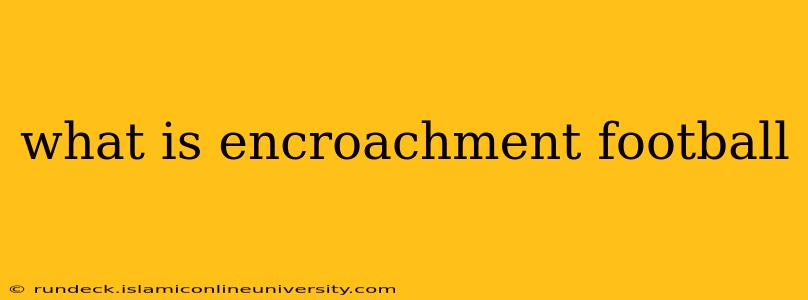Encroachment in football (gridiron football, American football) is a common penalty that occurs when a defensive player crosses the line of scrimmage before the ball is snapped. It's a fundamental rule designed to ensure fair play and prevent defensive teams from gaining an unfair advantage by prematurely entering the offensive team's territory. This guide will delve into the specifics of encroachment, its impact on the game, and frequently asked questions surrounding this penalty.
What constitutes encroachment?
Encroachment is specifically defined as any part of a defensive player's body—including their helmet, hands, or feet—being across the line of scrimmage before the ball is snapped. This applies regardless of whether the player is in motion or standing still. The key element is the premature crossing of the line before the snap. Even a slight movement across the line can be called as encroachment.
The referee's judgment is crucial here. Subtle movements can be hard to detect, and the referee has the ultimate authority in determining whether encroachment has occurred.
What happens when encroachment occurs?
When encroachment is called, the penalty is typically a five-yard penalty against the defending team. The down is repeated from the original line of scrimmage. The offensive team benefits from the free play and the chance to repeat the down from the same starting point.
How is encroachment different from other pre-snap penalties?
Encroachment is distinct from other pre-snap penalties like offsides. Offsides occurs when a defensive player crosses the line of scrimmage after the ball is snapped, but before it has been touched by an offensive player. The distinction lies in the timing: before the snap for encroachment, and after the snap but before the offensive player touches it for offsides.
Can a player be penalized for encroachment unintentionally?
Yes. Encroachment doesn't require malicious intent. Even an unintentional crossing of the line of scrimmage before the snap results in the penalty. Players must maintain their position behind the line of scrimmage until the ball is snapped.
Why is encroachment penalized so strictly?
The strict penalty for encroachment emphasizes fair play. Allowing defensive players to cross the line prematurely would provide an unfair advantage, potentially disrupting the offensive team's play and strategy. The penalty discourages this behavior and helps maintain a level playing field.
How can defensive players avoid encroachment penalties?
To avoid encroachment penalties, defensive players must focus on maintaining their position behind the line of scrimmage until the ball is snapped. Proper training and discipline are key to preventing such penalties. Coaches emphasize good technique and concentration to help players maintain their alignment and avoid unintentional encroachment.
What are some common causes of encroachment?
Common causes include:
- Anticipation: Defensive players anticipating the snap too early and moving forward.
- Poor positioning: Players positioned too close to the line of scrimmage, resulting in an accidental crossing.
- Nerves or excitement: The pressure of the game can sometimes lead to players making premature movements.
How are encroachment calls made?
Referees watch closely for any movement by the defensive line before the ball is snapped. They rely on their judgment and visual observation to call encroachment. While instant replay may be used for other calls, encroachment is generally a judgment call made in real-time.
Encroachment is a fundamental rule in football designed to maintain fairness and prevent defensive advantages. Understanding its definition and implications is crucial for both players and fans alike.
